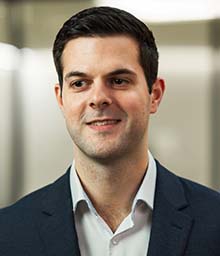 ANTON KERKENEZOV, EMD CORPORATE PORTFOLIO MANAGER, AVIVA INVESTORS
What is your investment outlook for emerging markets over the next 12-18 months?
ANTON KERKENEZOV, EMD CORPORATE PORTFOLIO MANAGER, AVIVA INVESTORS
What is your investment outlook for emerging markets over the next 12-18 months?Whilst the outlook for emerging markets is still uncertain, the global growth outlook seems to have found a base and is gradually improving, which at the margin is more supportive for risk and emerging markets. A huge effort has been made to support economies and financial markets. While this has been successful, significant uncertainty remains as to the impact of what has happened so far and what else could be to come. The key risk right now is obviously the second wave of the virus, which would, at the very least, significantly slow the global economic recovery that is seemingly underway based on recent data. However, commitment to policy is extremely strong, which removes any fear of a sizeable drawdown. For many countries, the fundamental deterioration is real and of significant magnitude. Differentiation between EM economies is likely to remain elevated. How big is the opportunity set to buy bonds in good companies whose credit rating is capped by the sovereign rating?
Most EM companies have their ratings capped by the sovereign rating. In the current environment, we are seeing corporates cut operating expenditures and capital expenditures to protect balance sheets. Sovereigns, on the other hand, are increasing their fiscal spending to prevent a deep economic crisis. This is creating a unique opportunity to invest in EM corporates as it has translated into wider spreads for both sovereign and corporates even though the fundamental trajectory is stronger in EM corporates. How are Asian EMs faring versus non-Asian EMs and what type of bifurcations are we seeing, if any?
EM economies have had different approaches to dealing with Covid-19. Asian economies implemented lockdowns earlier than most countries and are currently experiencing a slighter better recovery than non-Asia EMs. This doesn’t apply to all Asian economies, for example India is still experiencing challenges with Covid-19. In Latin America, the picture is very different. Peru and Chile were proactive on implementing lockdowns and are now focused on restarting economic activity in a safe way. Brazil and Mexico downplayed the impacts of Covid-19 and were not quick to implement protective measures and are thus behind the curve compared to most EM economies. What impact will the Covid-19 pandemic have on the GDP of emerging markets and investors?
The fallout from the Covid-19 crisis has left many countries poorer, with more debt and much wider budget deficits. According to IMF estimates, nearly a decade of improving income has been wiped out in sub-Saharan Africa. Many countries now have a more uncertain growth trajectory. How they pull through will be largely determined by how strong their economies, healthcare and social structures were going into the crisis. In many respects, Covid-19 has accelerated some of the trends that we have been concerned about for a number of years, such as rising debt and low growth. We think, Covid has accelerated these trends because:
- High-yield countries have much less firepower to stimulate their economies to grow, with limited capacity for unconventional policy like quantitative easing.
- High-yield countries’ budget deficits are likely to remain wider for longer, which will push debt higher.
- Growth could remain structurally weaker in high-yield countries due to large informal sectors and as tourism and remittances take time to recover.
Whilst the outlook for many EM economies is challenged, opportunities exist. Fundamental analysis is at the core of any investment decision. However, added awareness of the macroeconomic environment, valuations, adequate compensation for risk and technical factors make for portfolios that are better able to deliver on their objectives. Recognising that you could be wrong and challenging prevailing investment rationale is even more important in times like these. © 2020 funds global asia

 At times like these, HSBC Asset Management easily pivots towards emerging markets.
At times like these, HSBC Asset Management easily pivots towards emerging markets. A comprehensive, cost-effective, and transparent currency overlay hedging solution is crucial to mitigate FX exposure risks in the complex landscapes of Japan and China's FX markets, explains Hans Jacob Feder, PhD, global head of FX services at MUFG Investor Services.
A comprehensive, cost-effective, and transparent currency overlay hedging solution is crucial to mitigate FX exposure risks in the complex landscapes of Japan and China's FX markets, explains Hans Jacob Feder, PhD, global head of FX services at MUFG Investor Services. The world is transitioning from an era of commodity abundance to one of undersupply. Ben Ross and Tyler Rosenlicht of Cohen & Steers believe this shift may result in significant returns for commodities and resource producers over the next decade.
The world is transitioning from an era of commodity abundance to one of undersupply. Ben Ross and Tyler Rosenlicht of Cohen & Steers believe this shift may result in significant returns for commodities and resource producers over the next decade. Ross Dilkes, fixed income portfolio manager at Wellington Management, examines the opportunities and risks for bond investors presented by the region’s decarbonisation agenda.
Ross Dilkes, fixed income portfolio manager at Wellington Management, examines the opportunities and risks for bond investors presented by the region’s decarbonisation agenda. Shareholders in Japan no longer accept below-par corporate governance standards. Changes are taking place, but there are still areas for improvement, says Tetsuro Takase at SuMi Trust.
Shareholders in Japan no longer accept below-par corporate governance standards. Changes are taking place, but there are still areas for improvement, says Tetsuro Takase at SuMi Trust. Robert St Clair, head of investment strategy at Fullerton Fund Management, explores the reasons investors should be paying attention to the rising demand for healthcare in China.
Robert St Clair, head of investment strategy at Fullerton Fund Management, explores the reasons investors should be paying attention to the rising demand for healthcare in China.


